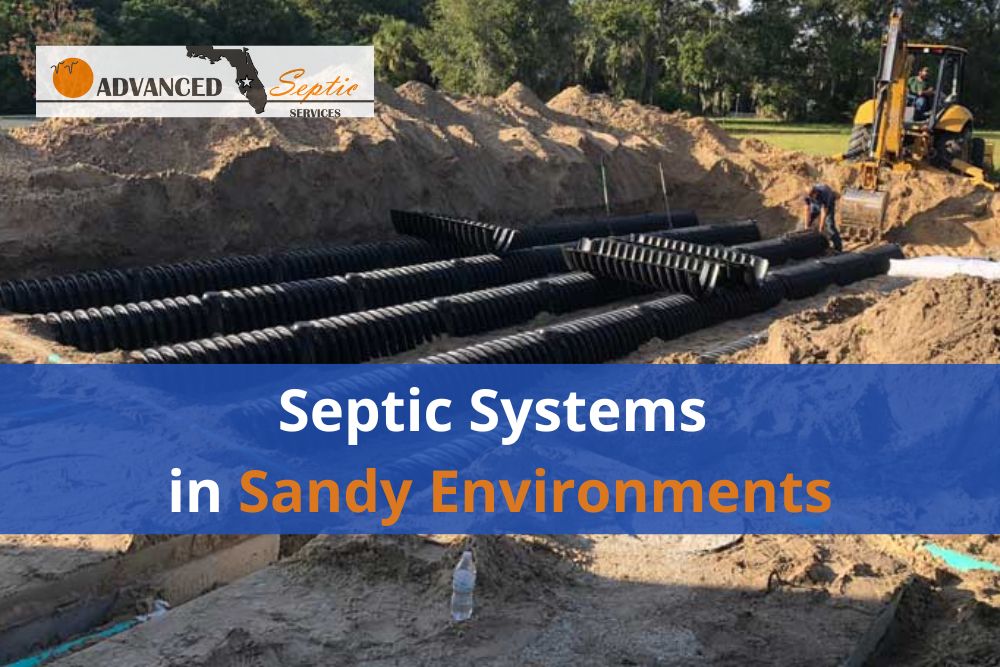When your property sits on sandy soil, unique challenges can arise—challenges many Florida homeowners know all too well.
Sandy soil environments present specific considerations that homeowners must address to prevent system failure and environmental contamination. This article will explore the challenges and best practices associated with septic system upkeep in sandy soil conditions.

Understanding the Challenges of Septic Systems in Sandy Soil
Sandy soil, characterized by its loose, granular texture, poses distinct challenges for septic systems. Unlike clay or loamy soil, which provide natural filtration and retention of wastewater, sandy soil allows water to percolate rapidly. This rapid percolation can lead to the quick movement of effluent through the soil, potentially reaching groundwater sources before adequate treatment occurs. Additionally, sandy soil lacks the cohesive properties of other soil types, making it prone to erosion and shifting, which can compromise the integrity of septic system components.
Tips for Septic System Upkeep in Sandy Soil
Proper Tank Maintenance
Regular pumping and septic tank inspection are essential in sandy soil environments. Sandy soil’s rapid drainage can result in quicker accumulation of solids in the tank, necessitating more frequent pumping schedules. Homeowners should adhere to recommended pumping intervals to prevent solids from entering the drain field and clogging the soil.
Working with a septic company that knows your local area and soil is essential. At Advanced Septic Services of Florida, we know the ins and outs of the Lake County environment and are here to help.
Monitoring Water Usage
In sandy soil conditions, excessive water usage can overwhelm the septic system and lead to premature failure. Homeowners should implement water conservation measures, such as fixing leaks, installing low-flow fixtures, and spreading laundry and dishwasher loads.
For Florida homeowners, this becomes especially important during heavy rains and hurricane season. By reducing water usage, homeowners can mitigate the strain on their septic system and prolong its lifespan.
Implementing Proper Drain Field Design
The design and installation of the drain field are critical factors in sandy soil environments. Professionals should assess the soil’s permeability and depth to determine the appropriate size and layout of the drain field. Additionally, incorporating measures such as sand mounds or alternative treatment technologies can enhance treatment efficiency in sandy soil conditions.
Vegetative Cover and Erosion Control
Erosion control is paramount in sandy soil environments to prevent soil displacement and maintain the integrity of the septic system — especially for lake homes. Planting grasses or other vegetation with deep root systems can stabilize the soil and reduce erosion (just make sure they do not penetrate your drain field pipes or tank). Additionally, homeowners should avoid compacting the soil over the drain field area, as compaction can impede water infiltration and drainage.
Regular Inspections and Maintenance
Routine inspections by qualified professionals are essential for identifying potential issues early and addressing them before they escalate. Inspections should include an assessment of the tank, drain field, and associated components. Any signs of a system malfunction, such as surfacing effluent or foul odors, should prompt immediate attention and remediation.
Maintaining a Septic System in a Sandy Area
Maintaining a septic system in sandy soil environments like Central Florida requires careful attention to unique challenges and proactive implementation of best practices. Homeowners can ensure the longevity and functionality of their septic systems by prioritizing proper tank maintenance, monitoring water usage, implementing appropriate drain field design, controlling erosion, and conducting regular inspections. With diligence and awareness, septic system upkeep in sandy soil conditions can be effectively managed, safeguarding property value and environmental integrity.

